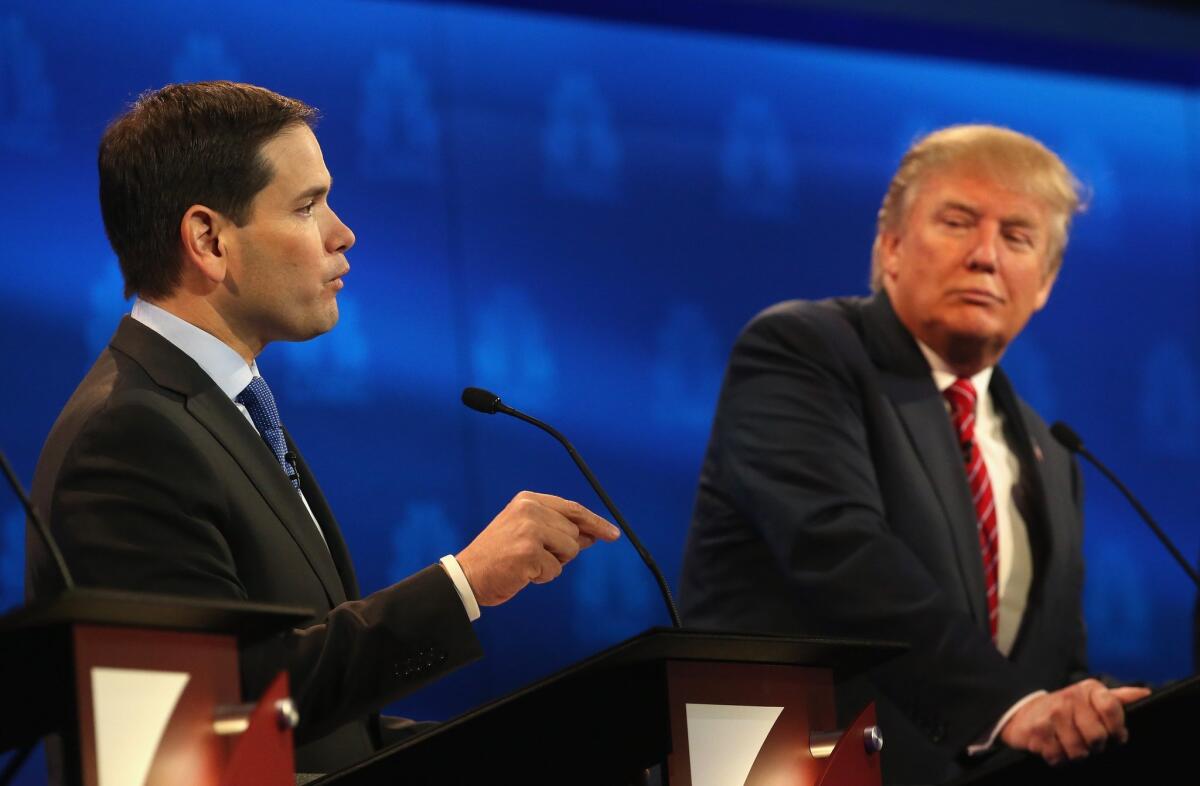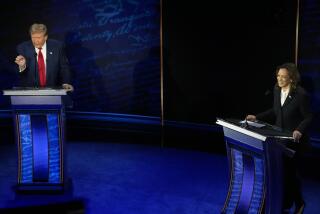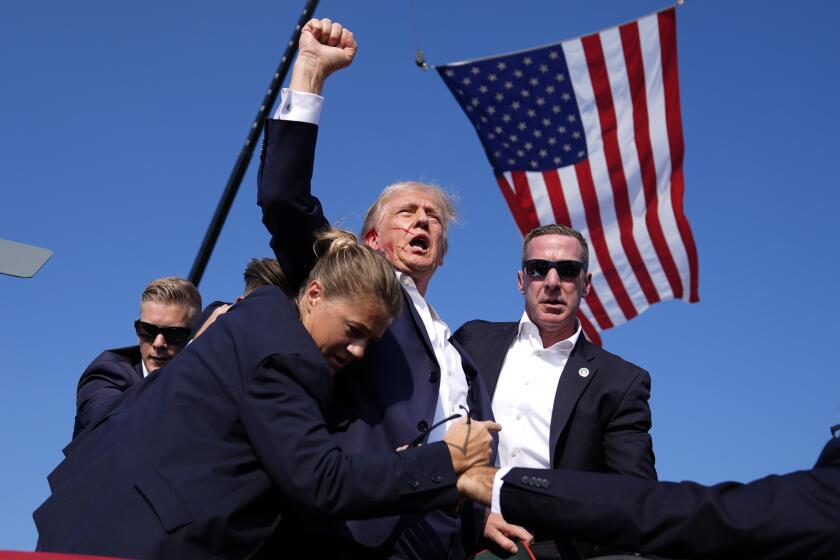Analysis: Third GOP debate appears to broaden field, not winnow it

Republican presidential hopeful Sen. Marco Rubio of Florida speaks while Donald Trump looks on during the Republican debate Wednesday night. Rubioâs strong performance seems likely to boost his standing in the GOP field.
The third Republican presidential debate was supposed to be one that winnowed the field. Instead, it is likely to revive several faltering candidates, while harming only one -- former front-runner Jeb Bush.
The event Wednesday night suggested that, even as the Democratic contest is narrowing, the race for the Republican nomination remains wide open, with months to go before the first states to vote -- Iowa, New Hampshire and South Carolina -- finally force some consolidation onto a field that still includes more than a dozen candidates.
SIGN UP for the free Essential Politics newsletter >>
Prognosticators had predicted a fight between Donald Trump and the man who only recently leapfrogged him in national and Iowa polls -- retired neurosurgeon Ben Carson. But those two were bit players for most of the evening. Oddly, perhaps, neither Trumpâs business background -- nor the CEO experience of Carly Fiorina -- let them dominate a debate focused sharply on the economy and budgetary matters.

Timesâ political analyst Cathleen Decker and Timesâ political writer Seema Mehta talk about the third Republican debate.
Instead, it was those in the middle of the pack who appeared to have benefited from the two hours of verbal sparring, specifically Florida Sen. Marco Rubio, Ohio Gov. John Kasich, Texas Sen. Ted Cruz and even New Jersey Gov. Chris Christie.
At the other end of the spectrum, Bush, the former Florida governor, entered the debate beleaguered, and may have left it in even worse shape. In the last week, Bush sharply cut his campaignâs staff and salaries to save money as he tried to bolster the confidence of donors who have worried as he languishes in the lower reaches of polling, both nationally and in early states.
But hardly anything he did Wednesday night appeared to dramatically, or even minimally, improve his standing. He was repeatedly outpointed by Rubio, his fellow Floridian, including during a sharp back-and-forth between the two as they stood side by side onstage at the University of Colorado in Boulder.
Bushâs best moment -- temporarily -- was a light bit in answer to a question about online sports gambling. But Christie almost immediately obliterated Bushâs comment, to a roar from the assembled crowd.
TRAIL GUIDE: All the latest news on the 2016 presidential campaign >>
The Republican debate came at a fraught point in the 2016 campaign, particularly for Trump. A CBS/New York Times poll published earlier this week found Carson overtaking the New York developer in the national horse race, 26% to 22%. (Most of the other candidates trailed far behind.)
His loss of the national lead, at least in that survey, followed several recent polls showing him behind Carson in Iowa, the first voting state. Trump castigated the polls as inaccurate and expressed shock that he was trailing Carson. Since Trump has routinely dumped on candidates he perceives as a threat, Wednesday loomed with the promise of a Trump-Carson battle. But none developed.
Indeed, Kasich opened the debate with a broadside at several candidates, suggesting that some were not capable of doing the job. Soon after, he blistered Carsonâs tax plan as a âfantasy.â
âWhy donât we just give a chicken in every pot, while weâre ... coming up with these fantasy tax schemes?â Kasich asked.
Trump responded by defending Carson, in effect, by criticizing Kasichâs former work at Lehman Brothers, one of the financial firms whose implosion contributed to the Great Recession in 2008.
Kasich moved aggressively throughout the debate, routinely citing Ohioâs economic resurgence as a rationale for his presidential candidacy. And if he halted his criticism of Carson at that moment, it was later taken up by CNBC correspondent Becky Quick, one of the moderators, who said Carsonâs tax plan would leave a $1 trillion to $2 trillion hole in the budget. Throughout, Carson appeared tentative.
If the main bout was expected to be Trump-Carson, the secondary battle was expected to be Bush vs. Rubio. And that did develop, in perhaps the spiciest moment of the debate. After questioner Carl Quintanilla asked Rubio to respond to criticism that he has missed Senate votes while he pursues higher office, Bush interceded.
âMarco, when you signed up for this, this was a six-year-term, and you should be showing up for work.... You can campaign, or just resign and let someone else take the job,â Bush told Rubio.
Rubio noted that he had âtremendous admirationâ for Bush and immediately used the moment to cast himself as the candidate best equipped to beat Hillary Rodham Clinton. Indeed, he was adept throughout the night at turning questions to his advantage by reminding viewers of his familyâs immigrant history. He mentioned his bartender father, his maid mother -- both emigres from Cuba -- and the dry cleaner whose services he uses. He brushed aside questions about his handling of his own finances and whether their rocky nature disqualified him from running the government.
âIâm not worried about my finances; Iâm worried about the finances of everyday Americans who today are struggling,â he said, one of several instances where, facing directly at the camera, he appealed to voters.
If Rubio presented an uplifting personal story, Cruz and to some extent Christie benefited from the aspersions they cast.
In an answer that drew raves from the crowd, Cruz stomped on a familiar GOP foe, the media, by maligning the moderatorsâ questions to his fellow candidates as mean-spirited.
Those questions were in âcontrast with the Democratic debate, where every fawning question from the media was, âWhich of you is more handsome, and why?ââ Cruz said. (Christie later criticized questioner John Harwood as ârudeâ -- even, he said, by the standards of argumentative New Jersey.)
But the exchange that said more than anything about the possibilities that opened for the successful debaters -- and may have closed off for Bush -- came after Bush was asked whether online sports betting should be regulated. Bush replied with a lighthearted aside about his fantasy football team, and then allowed that âsome regulationâ was perhaps called for.
Christie cut in immediately: âWe have $19 trillion in debt. We have people out of work. We have ISIS and Al Qaeda attacking us. And weâre talking about fantasy football? Can we stop?â
The crowd roared with an enthusiasm rarely heard by Christie during his long and star-crossed struggle for notice in the 2016 race. And, as the debate scrambled the field anew, the applause seemed to portend months of unpredictability ahead.
For more on politics, follow @cathleendecker
MORE ON THE REPUBLICAN DEBATE
Republican debate: Candidates seeking an edge go after front-runners and one another
Ben Carson says thereâs nothing contradictory about his gay marriage views
Watch Donald Trump say he packs heat
More to Read
Get the L.A. Times Politics newsletter
Deeply reported insights into legislation, politics and policy from Sacramento, Washington and beyond. In your inbox three times per week.
You may occasionally receive promotional content from the Los Angeles Times.











